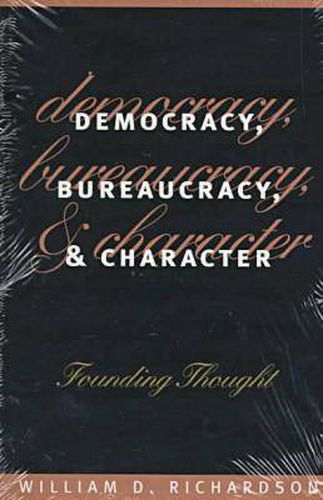Readings Newsletter
Become a Readings Member to make your shopping experience even easier.
Sign in or sign up for free!
You’re not far away from qualifying for FREE standard shipping within Australia
You’ve qualified for FREE standard shipping within Australia
The cart is loading…






Most American citizens are quick to criticize federal bureaucracy for its size and inefficiency. They assume it has exceeded the intent of our nation’s founders; yet men like James Madison and Alexander Hamilton knew that good public administrators were essential to good government. William Richardson here examines the origins, legitimacy, and limitations of public administration from the perspective of the Founders’ thought. He shows that these men–especially the authors of The Federalist–advocated an energetic public administration as an essential component of government and even considered the emergence of a natural aristocracy of virtuous civil servants. The Founders would see the fault of today’s federal bureaucracy, argues Richardson, not as much in its size as in the character of its members.
Richardson relates the Founders’ belief that the nation should strive to produce public servants committed to developing character traits, such as wisdom and moderation, that would exemplify the highest ideals of the republic and thus ensure its survival. They anticipated some self-interest on the part of administrators, but believed it would be held in check by public opinion and the political process.
To test the success of the Founders’ ideal, Richardson examines both the character of administrators and the role of ethics in forming that character. He explores the various plans for educating public leaders throughout American history and looks at how attitudes toward public administration have changed in this century, from Woodrow Wilson’s scientific ideal to recent proposals to downsize government. Among other suggestions, Richardson advocates reforming existing institutions by emphasizing character.
Democracy, Bureaucracy, and Character is an exercise in legitimizing public administration, offering important insights into the Founders’ thoughts that can be applied to today’s debate over government bureaucracy. Public administration may be problematic by nature, observes Richardson, but it is crucial to our form of government. Through his analysis we can see that, while bureaucracy and democracy have long had an uneasy relationship, neither can be effective unless we fully assess the place and purpose of character in the American regime.
$9.00 standard shipping within Australia
FREE standard shipping within Australia for orders over $100.00
Express & International shipping calculated at checkout
Most American citizens are quick to criticize federal bureaucracy for its size and inefficiency. They assume it has exceeded the intent of our nation’s founders; yet men like James Madison and Alexander Hamilton knew that good public administrators were essential to good government. William Richardson here examines the origins, legitimacy, and limitations of public administration from the perspective of the Founders’ thought. He shows that these men–especially the authors of The Federalist–advocated an energetic public administration as an essential component of government and even considered the emergence of a natural aristocracy of virtuous civil servants. The Founders would see the fault of today’s federal bureaucracy, argues Richardson, not as much in its size as in the character of its members.
Richardson relates the Founders’ belief that the nation should strive to produce public servants committed to developing character traits, such as wisdom and moderation, that would exemplify the highest ideals of the republic and thus ensure its survival. They anticipated some self-interest on the part of administrators, but believed it would be held in check by public opinion and the political process.
To test the success of the Founders’ ideal, Richardson examines both the character of administrators and the role of ethics in forming that character. He explores the various plans for educating public leaders throughout American history and looks at how attitudes toward public administration have changed in this century, from Woodrow Wilson’s scientific ideal to recent proposals to downsize government. Among other suggestions, Richardson advocates reforming existing institutions by emphasizing character.
Democracy, Bureaucracy, and Character is an exercise in legitimizing public administration, offering important insights into the Founders’ thoughts that can be applied to today’s debate over government bureaucracy. Public administration may be problematic by nature, observes Richardson, but it is crucial to our form of government. Through his analysis we can see that, while bureaucracy and democracy have long had an uneasy relationship, neither can be effective unless we fully assess the place and purpose of character in the American regime.